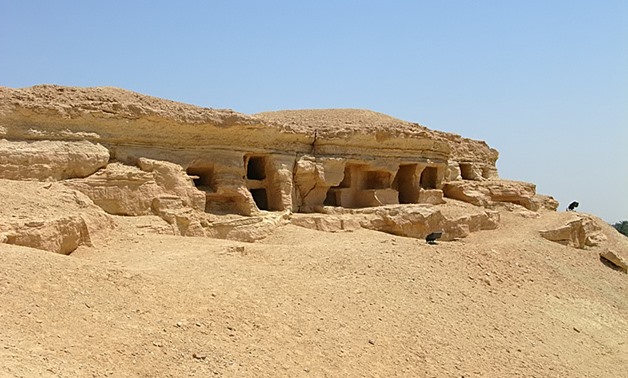
Siwa Mawta tomb sept 3, 2007 – Wikimedia/ Roland Unger
CAIRO – 28 November 2017: Infinite secrets will surprise you every time you take the step to visit Siwa.
Heading to the northern end of Siwa, a small hill from sandstone rock, peppered with hundreds of holes, will cause you to stop for hours. You will want to discover the inside and outside of the hill, both of which are magical. This hill is Gebel al-Mawta.
 Hundreds of holes pockmark Gebel al-Mawta in Siwa, May 11, 2011 – Flicker.com/ Heather Cowper
Hundreds of holes pockmark Gebel al-Mawta in Siwa, May 11, 2011 – Flicker.com/ Heather Cowper
When you first enter the hill, which is considered by many to be a Pharaonic, Roman and Ptolemaic graveyard, and go down the first few steps, you are met with a honeycomb wall with paintings dating back to the 26th Ptolemaic dynasty and Roman times.
 West side of Gebel al-Mawta in Siwa, September 3, 2007- Wikimedia/ Roland Unger
West side of Gebel al-Mawta in Siwa, September 3, 2007- Wikimedia/ Roland Unger
There are four main tombs. First, Si-Amun has colored roofs of a dead man thought to be a Greek landowner or merchant praying for Egyptian gods. Second, the Mesu-Isis tomb is full of depictions of cobras in red and blue. Third, Niperbathot includes crude drawings in reddish ink, similar to that seen today on modern Siwan pottery.
 Entrance of a tomb inside Gebel al-Mawta in Siwa, February 13, 2001 – Wikimeda/ Roland Unger
Entrance of a tomb inside Gebel al-Mawta in Siwa, February 13, 2001 – Wikimeda/ Roland Unger
Fourth, the Crocodile tomb represents yellow crocodiles of the god Sobek and has walls and ceilings painted in red, ochre and cobalt blue of the ancient Egyptian gods and goddesses.
From the top of Gebel al-Mawta, you can take a panorama view over the whole oasis.



Comments
Leave a Comment